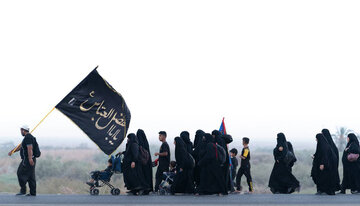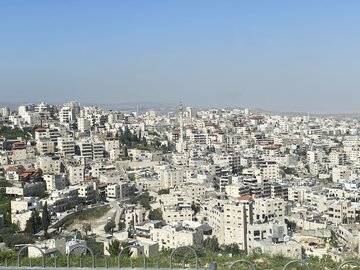His Eminence, Sheikh Hussein Al-Kheshen
Talking about the Sayyed brings about much agony and talking about him in the past tense brings about even more heartache, for "the Sayyed" is always present in our souls as the sun shines over the horizon, as hope glows in the eyes of children and as spirits are embraced in bodies.
Talking about the Sayyed from the platform of his mosque, a few steps away from the shrine that gently embraces his soul is both interesting and agonizing.
It is interesting because you, dear Sayyed, are the core of the talk; talking about you is charming, all what brings us closer to you takes our breaths away, and all what attracts us to you is sweet, despite the bitterness of parting.
It is agonizing because he who wishes to talk about you, O loved Sayyed, stands in awe of your position, trying to learn how he can address you; shall he talk about the Sayyed, the human being, or the thinker, or the jurisprudent or the poet or the caller and the godfather?!
O loved Sayyed, you always wanted us to be bold and courageous, and you always wanted us to be the nation that maintains critical thinking; a nation that uses its minds and thinks of what no one has thought of.
We pledge, O loved Sayyed, that we will continue to uphold the responsibility of following your line; the line of Islam and nothing but Islam. You believed that there were no several lines, revoking the thought that every hero has his own line, which makes the lines diversify as the heroes increase in number. Nay, you believed in the thought of having one line for all heroes; thus, maintaining one line no matter how the heroes increase in number. We pledge loyalty to you by working as one nation and not making you the last hero, although we know how hard this task will be for those who shall come after you.
Wisdom in the methodology of the Sayyed
Talking about the Sayyed from the aspect of "wisdom and goodly exhortation" is astounding, knowing that this title reflects deep and careful thinking, for wisdom is embodied in "the Sayyed" and "the Sayyed" signifies wisdom.
Perhaps, the wisdom of "the Sayyed" directs us to one of his character's traits, which the missionary moral trait that constitutes one of the most important elements in his personality. "The Sayyed" was flourished with wisdom in his call, relations, and his missionary and moral movement, for he believed that the morals are a movement in reality. He truly enjoyed prophetic morals, which made him stand out from amongst his peers, knowing that I am familiar and acquainted with them. The Sayyed stood out and surpassed many scholars. He enjoyed sublime morals, he was inspirational in his modesty and capacity to tolerate and forbear harm inflicted upon him from all sides, and he was transcendent in the way he understood people, contained them and was patient on them. All that cannot but remind us of the Messenger of Allah (p.), whom Allah addressed as follows: "And withhold yourself with those who call on their Lord morning and evening desiring His goodwill." (18:28).
I believe that it is our responsibility to turn this side of the personality of "the Sayyed" into a methodology standing by itself, by picking up all the signs that reflect fine prophetic morals and turning them into a practical methodology, so that "the Sayyed" would become a role model for our generation and the generations to come.
The thinker and the reformist
The Sayyed's wisdom steers us, as well, towards "the Sayyed", the thinker, for one cannot be a thinker unless he is wise, and towards "the Sayyed", the reformist, for one cannot be a reformist without wisdom.
Wisdom, in the school of the Sayyed, represents the balance that sets man's pace in his thought, emotions and behavior.
We need wisdom in our thoughts, so as not to fall prey to excessiveness and extravagance, in our emotions, so as not fall into blind love or acquire black grudges and in all our life and practical behavior so as not to be plagued with aberration, deviation or misguidance.
Wisdom, according to "the Sayyed", does not entail any lip servicing or succumbing to reality; but rather, he sees that the wisdom, at certain times, lies in shocking the reality to shake it and awaken the minds from their sleep. Thus, wisdom was the title that inspired "the Sayyed" in his methodology of reform.
The reform mission in the school of "the Sayyed" is an act of worship that Allah calls for performing on the line of Abu Abdullah, Al-Hussein (a.s.), who said: "I did not rise [against the tyrannical rule of Bani Umayyad] out of selfishness or with the aim of oppression or corruption! But rather, I rose to seek reform in my grandfather's nation, I want to enjoin good and forbid evil." I imagine "the Sayyed" asking us: "If the Islamic nation was in need for reform half a century after the death of the Messenger of Allah (p.), where Al-Hussein (a.s.) undertook this task, to what extent this would grow after several centuries have passed?! Would not this task need several reformists and several individuals ready to fully dedicate themselves for this purpose?!
"The Sayyed" adopted reform in two lines: reform at the level of the souls and reform at the level of the texts.
Concerning reform at the level of the souls, it constitutes a solemn and great task, as it the task of the prophets and messengers. This kind of reform should start by reforming ourselves, in the first place, and then turn to reforming others, which should take place on two levels:
- Making reconciliations between people
- Reforming the people themselves
This first level stands for a general mission every man is charged with, which calls him to make reconciliation between people if they dispute or drift apart from each other. Allah wanted us all, without any difference between one and another, to undertake this mission, for he says: "The Believers are but a single Brotherhood: So make peace and reconciliation between your two (contending) brothers; and fear Allah, that ye may receive Mercy." (49:10).
As for the second aspect, it signifies a special mission that only few people can undertake, where the reformist has to reform people, as individuals or in groups. Reforming an individual takes place by guiding him to the straight path, and reforming the nation necessitates steering it towards the path of the rising. It must be noted that reforming the individual does not substitute reforming the nation, for the individual might be in a good and healthy condition, yet the nation would be undeveloped.
If the reformist who seeks making reconciliations between people plays the role of the extinguisher, then the reformist who seeks making reform within the people's souls plays the role of the reviver, who brings the dead hearts back to life, for Allah says: "And whoever keeps it [the soul] alive, it is as though he kept alive all men," (05:32), knowing that Ahl El-Beit (a.s.) consider that keeping it alive is to take it out of misguidance into guidance."
The second line is the line of reform at the level of the texts, by changing the way we view and deal with them, knowing that reform, in this sense, does not signify Ijtihad as an alternative to the text; but rather, as an understanding of the text and its purposes.
We notice that the view of "the Sayyed", in this respect, was reviving and innovating, as he looked into the texts away from all explanations and interpretations. He dealt with the Quran as if it was revealed to him. This is one of the Sayyed's significant traits, as he used to say to his students: "Read the texts before you read the interpretations, and read the content [of the texts] before you read what is in the margins." He wanted us to be in direct contact with the text, for interpretations overburdened the texts in all religions and not only in Islam.
We call for re-reading the Sayyed
The reformatory Sayyed started his mission for reform with himself, and he did reform it armed with such boldness and courage that made him proceed no matter what. Thus, I say to all those who had disagreement and differences when it came to the Sayyed: Let us, after he had departed us, think thoroughly of "the Sayyed"; let us look thoroughly into his thought, jurisprudence and interpretations, his intellectual and literary heritage, as well as his entire missionary journey… Let us read him on the basis of fairness and justice, and not praise or wrath. If dusty clouds obscured our view towards him in his life, let his departure, as he told us in some of his wills, be an opportunity for meditation and reconsideration.
But it brings about much grief and sorrow to say: A nation that appreciates its great ones after their departure, having thrown stones at them in their life, and once they left it held their banner and glorified their names… such a nation is not worthy of such great individuals…
May Allah bestow His mercy upon you, O beloved Sayyed, the reformist … May Allah bestow His mercy upon you, and may He make your abode in Heaven. We invoke Allah, the Most Exalted, to grant us success in following your path; the path of prophets, Imams and martyrs. Peace be upon you they day you were born and the day you will be brought back to life.
A speech delivered at the annual educational conference of Al-Mabarrat Charity Association.
End item/ 129




